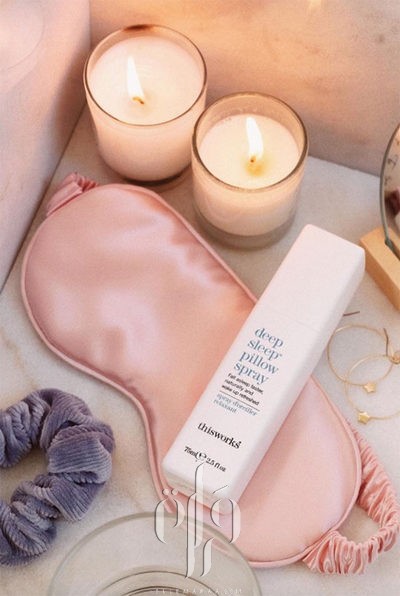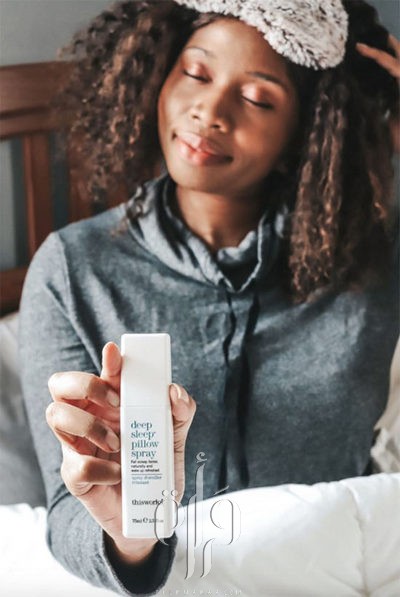Pillow sprays are a form of aromatherapy – they’re fragrances that you mist over your pillow, and their scent puts your mind at ease and lulls you to sleep. They’re a small luxury, but their effects are backed by science, so they’re well worth a try!
In this article, we dive deep into the science of aromatherapy and how it can help you fall asleep at night. We’ve also included some tips that’ll help you fall asleep every night.
What Is a Pillow Spray and Does It Work?
A sleep spray or pillow spray is basically a light perfume that you spray on your pillow before going to sleep at night. The spray is crafted based on principles of aromatherapy, with natural essential oils that are known to have calming effects. The scents have a relaxing effect, so they help the mind drift off to sleep more easily. Even if you don’t have trouble sleeping, they can definitely turn your bedtime routine into something a little more special.
While sleeping sprays themselves haven’t been studied, there has been some exciting research about aromatherapy as a sleep aid. A Japanese study from 2017 found that having a towel scented with essential oils wrapped around their pillow helped a group of elderly people with dementia sleep better and for longer. Before that, in 2015, a meta-analysis found that most early research also seemed to suggest that aromatherapy could help with sleep.

Benefits of Using a Sleep Spray
Now that we know that these sleep sprays can have real effects let’s talk about some of their benefits, even if it might seem obvious.
First things first, sleep is ridiculously important! Anything that can help our bodies recharge is important since without sleep we will slowly cease to function.
As far as sleep aids go, pillow mists are absurdly easy to use. We give a few other sleep hygiene tips at the end of the article, and it’s undeniable that spraying some lavender oil on your pillow is one of the simplest of the bunch.
Sleeping mists are also very safe (assuming you aren’t allergic). They’re definitely worth a try before you resort to something more intense like sleeping pills.
Finally, sleeping sprays are very pleasant! Even if they don’t work for you, they are still an enjoyable thing to try because they make your bed or room smell fantastic.
There are two mechanisms that can explain how sleep sprays can improve sleep. According to one study, aromatherapy with lavender was able to increase melatonin levels (the sleep hormone) in the body, which correlates with better sleep.
The other explanation is that spraying a sleep mist on your pillow helps create a bedtime ritual that tells the mind that it’s time for sleep. With regular use, the mind will come to associate the scent of your pillow spray with bedtime, and you’ll quickly feel more tired.
However, it’s very important to note that for aromatherapy to help, the person relying on it has to have no fragrance sensitivities or allergies. People with asthma or who are prone to migraines might find that sleeping mists trigger their symptoms, which will obviously only make falling asleep harder. If you can’t normally tolerate perfumes or scented products, it’s fair to say that sleeping mists aren’t for you.

What Are the Best Essential Oils for Sleep?
The best essential oils for sleep are ones known to have calming or anti-anxiety effects. The most important oil in every sleep spray formula is lavender oil, which has a long history as a calming, sleep-boosting, and anti-anxiety remedy.
Chamomile is the second most frequently used essential oil, and like lavender, it’s also known as an aid for reducing anxiety. Since anxiety often makes falling asleep more difficult, it’s a useful addition to any sleep-promoting blend.
Other oils that can be helpful include herbal oils from plants like vetiver and patchouli, woody oils from cedarwood, and resinous ones like frankincense.
Additionally, floral and citrus oils can help round out a sleep spray. Pure lavender or even lavender mixed with the other essential oils we’ve mentioned can smell a little too herbal or medicinal, so adding these oils can help round out the fragrance and make it smell a little more upscale and spa-like.
However, these oils (especially citrus ones) can also be a little stimulating, so they need to be used at a low percentage to avoid having their effects overpower the sleep-inducing effects of the other oils.
How to Use a Sleep Spray
Using a sleep spray is as easy as can be, and there are a few ways you can make it work for you.
Simply misting it over your pillow is the classic technique. Spray it on right as you go to bed – one or two pumps are usually enough to cover your pillow.
We do recommend sleeping on your back when you use the spray to avoid having the mist come in contact with your face.
You can also mist the spray on your linens instead of directly on your pillow if you’re worried about it coming in contact with your skin.
Some pillow mists also work well as room sprays. Before bed, spray the mist throughout your room or just above your bed. The scent will dissipate more quickly, and it’ll be a little softer.
Finally, some sleep mists double as body sprays, in which case you can mist them directly over your skin or hair after an evening shower and before going to bed.
